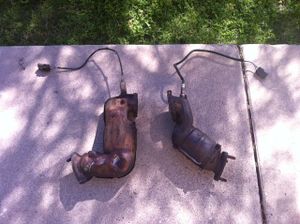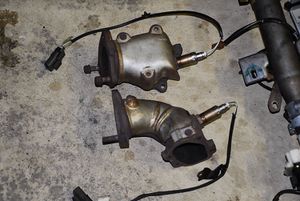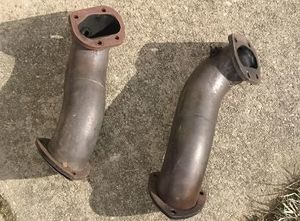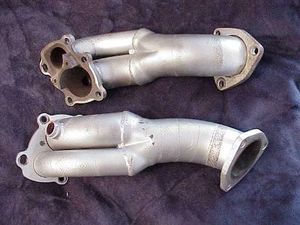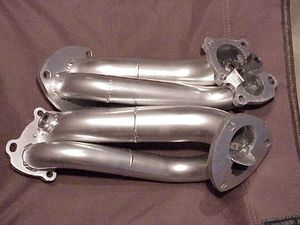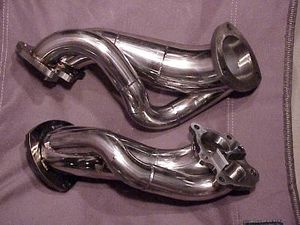Downpipes
Downpipes (also called Dump Tubes), are a portion of exhaust mounted directly off the turbocharger. They provide a means for exhaust gasses to leave the turbine housing and enter the main exhaust system. Downpipes also house the oxygen sensors on Z32s.
Downpipes should not be confused with headers, which are aftermarket exhaust manifolds on naturally aspirated cars.
Contents
Stock Turbo Exhaust Outlets
| USDM Turbo Exhaust Outlets (Pre-cats), with and without heat shields. |
JDM Turbo Exhaust Outlets. |
USDM
USDM downpipes contain catalytic converter material to help improve the Z32's emissions. Because they contain this material, and are part of the exhaust system before the main catalytic converters, they are generally referred to as pre-cats. "Downpipe" generally to refer to an aftermarket performance unit.
USDM turbo downpipes are unique, and require USDM turbo catalytic converters (or test pipes). Unlike JDM downpipes, they will not mount up to NA cat pipes.
JDM
JDM turbo exhaust outlets are much shorter and significantly less restrictive than USDM pre-cats. They do not contain any catalytic material, and their shape allows them to mate up to NA cat pipes. For all intents and purposes, JDM NAs and TTs use the same cat pipes. This, and their relative availability and low cost, makes them a common choice for owners doing twin turbo swaps, as it eliminates the need to purchase test pipes or different cats.
Gutting Pre-Cats
In the past, gutting pre-cats was a frequent practice for owners looking for a quick/cheap (read: free) power gain from their cars. This entails removing the catalytic material from the pre-cats, eliminating a large restriction right off the turbo. The results are not as dramatic as real aftermarket downpipes or even JDM downpipes, but the cost (again, free) is reason enough to do it for those on a budget. Z32s can generally pass emissions with or without the catalytic material present in the pre-cats.
Aftermarket Downpipes
The stock exhaust outlets are extreme restrictions in the exhaust of the Z32, and upgrading to aftermarket downpipes is said to be one of the best "seat-of-the-pants" upgrades out there for the car. They can be replaced with the engine in (though it can be somewhat difficult to do so), and are available for anywhere from $100 to $700, depending on the quality of construction, materials used, design, and brand.
Generations & Versions
There are a few different distinct generations of downpipes produced for the Z32 over the years.
Thanks to Robo's Site for much of this information and these images.
| Generation & Description |
Image |
|---|---|
| First Generation - Dump Tubes This was the first major aftermarket downpipe design readily available for the Z32. In addition to having no catalytic material, it eliminated many of the tight bends found in the stock pre-cat. |
|
| Second Generation - Divorced Style The divorced style was a major leap forward in design for Z32 downpipes. These were the first design to isolate the main exhaust outlet (off the turbine) from the wastegate portion of the turbine housing. By doing this, these downpipes reduced exhaust gas turbulence significantly. |
|
| Third Generation - Super Split This design was a slight improvement on the second generation, and are essentially the same except for the obvious difference: they keep the turbine and wastegate exhaust gasses isolated throughout the length of the downpipe, and featured a "fin" at the end to help the two exhaust streams flow together a bit more smoothly. |
|
| Forth Generation - Expansion Downpipes The forth and most modern design for Z32 downpipes is the Specialty Z-designed expansion downpipes. These got their name because the main exhaust gas pipe gradually expands as it gets closer to the cat-pipe (or test pipe). These also feature a more gradual and controlled entry of exhaust gas from the wastegate portion of the downpipe, further reducing turbulence between the turbine gas and wastegate gas. |
